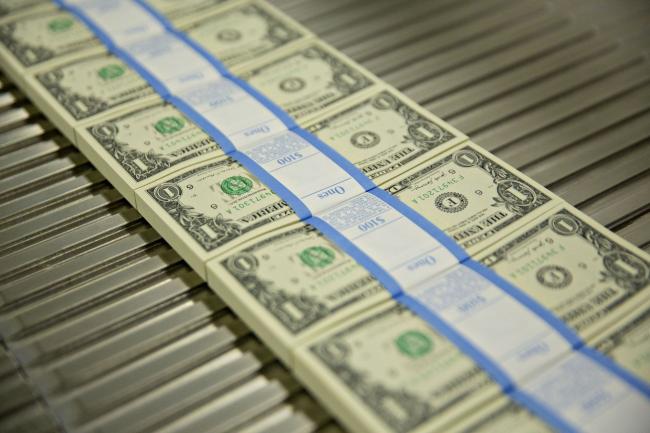(Bloomberg) --
The dollar surged, with a gauge rising to a record high, as investors sold all other assets to build a stockpile of the world’s reserve currency to withstand a prolonged coronavirus pandemic.
The currencies of Australia, New Zealand and Korea, the most liquid in Asia, all tumbled. Bonds and stocks across the region were dumped, spurring intervention from policymakers. The Bank of Japan offered to buy 1 trillion yen ($9.2 billion) of bonds in an unscheduled operation.
“Everything is getting sold,” said Chris Rands, portfolio manager at Nikko Asset Management Ltd. in Sydney. “We’re doing the absolute bare minimum because offering to sell anything in these markets is just crazy -- we’re trying our best to hang on and see where it all shakes out. I don’t see this dollar stampede going away.”
The rush for dollars is gaining pace despite every attempt by the Federal Reserve and its peers to provide liquidity through swaps, repurchase operations and emergency rate cuts. As the virus spreads and the death toll mounts, countries from Italy to Malaysia have locked down borders, strangling commerce and trade, and leading to a cash flow crunch for companies.
“We are seeing an unprecedented situation where the more central banks ease, the more dollars are being stacked,” said Min Gyeong-won, an economist at Shinhan Bank in Seoul. “The Fed’s bid for victory has failed, with markets not listening, worsening the dollar chaos and extending losses in Asian currencies.”
The Federal Reserve, which has slashed rates twice and pledged to buy more bonds, is debating whether to expand the scope of its interventions, according to Philadelphia Federal Reserve Bank President Patrick Harker. The BOJ is boosting purchases of corporate bonds and is also coordinating dollar swaps with the U.S. central bank, while the Reserve Bank of Australia is injecting liquidity through repo operations.
Read: Fed Tears Through 2008 Playbook to Counter Economic Hit of Virus
The Australian dollar tumbled 4.6% to 55.10 U.S. cents, its weakest since 2002. The won also dropped more than 4%, prompting policymakers to warn that the move was excessive.
Yields for Australia’s benchmark 10-year bond jumped by 32 basis points to 1.53%, while they also rose by a similar amount in New Zealand. U.S. stock futures dropped more than 3%.
“No asset class is safe right now from being sold to get your hands on dollars,” said Oriano Lizza, a sales trader at CMC Markets PLC in Singapore. “Normal market mechanics have disintegrated -- I don’t see any stop to this for some time yet with liquidity crunch worries in markets. It’s a case of sell everything you can to get the mighty dollar, it’s the ultimate haven.”
©2020 Bloomberg L.P.
